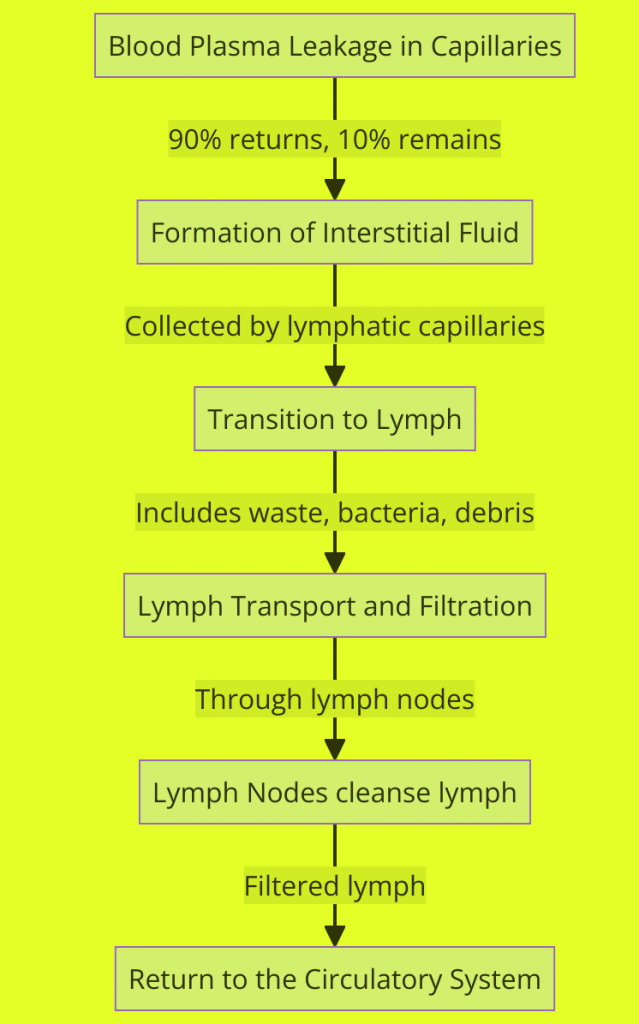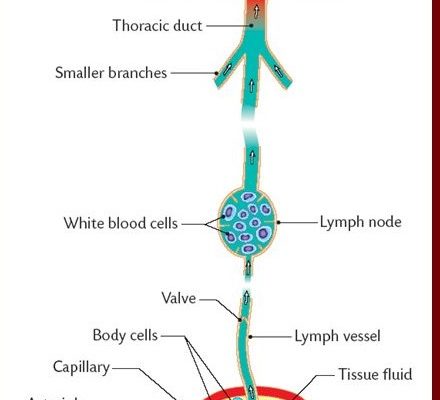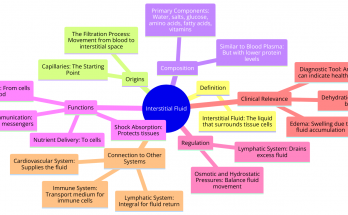Table of Contents
What is Lymph?
- Lymph is a colourless fluid that circulates throughout our body via the lymphatic system
- It resembles blood but lacks red blood cells and platelets.
- The composition of lymph varies, but it’s primarily made up of about 94% water and 6% dissolved substances, including proteins, salts, and white blood cells1.
How Lymph is Formed
Lymph is formed from a fluid called interstitial fluid.
6 Important steps of Lymph Formation

- Blood Plasma Leakage in Capillaries
- Formation of Interstitial Fluid
- Collection by Lymphatic Capillaries
- Transition to Lymph
- Lymph Transport and Filtration
- Return to the Circulatory System
Blood Plasma Leakage in Capillaries:
- When blood flows through tiny vessels called capillaries in our tissues, about 90% of the fluid (plasma) moves from the arterial end and returns to the bloodstream at the venous end. This fluid exchange is crucial for delivering nutrients and oxygen to cells and removing waste products.
Formation of Interstitial Fluid:
- The remaining 10% of the fluid does not return to the capillaries but instead accumulates in the spaces between cells, becoming known as interstitial fluid. This fluid bathes the cells in nutrients and carries away waste.
Collection by Lymphatic Capillaries:
- This is where the lymphatic system comes into play. Lymphatic capillaries, which are even smaller and more permeable than blood capillaries, collect this interstitial fluid. Their high permeability allows them to pick up not just the fluid but also larger molecules and particles that blood capillaries cannot.
Transition to Lymph:
- Once the interstitial fluid enters the lymphatic capillaries, it is referred to as lymph. This fluid now includes waste products, bacteria, and other debris from the tissues.
Lymph Transport and Filtration:
- The lymph is transported through a network of larger lymphatic vessels, moving through lymph nodes that filter out harmful substances. The lymph nodes act as checkpoints, cleansing the lymph of pathogens and foreign particles.
Return to the Circulatory System:
- After being filtered through the lymphatic system, the lymph eventually returns to the bloodstream. This return happens through larger lymphatic vessels that connect to the veins near the heart, ensuring the fluid and its contents are safely returned to the circulatory system.
Frequently asked questions on Formation of Lymph
What role do lymph nodes play in the immune system?
- Lymph nodes act as filters for the lymph fluid, trapping bacteria, viruses, and other foreign particles. They contain immune cells like lymphocytes and macrophages, which help fight infection by attacking and destroying these foreign substances.
Why doesn’t lymph have red blood cells?
- Lymph originates from interstitial fluid, which is the fluid that surrounds the body’s cells. It does not contain red blood cells because it’s not derived directly from blood but from the fluid that exits the capillaries and bathes the cells in nutrients.
How does the lymphatic system relate to the cardiovascular system?
- The lymphatic system complements the cardiovascular system by returning excess fluid from tissues back to the bloodstream, thus maintaining fluid balance in the body. It also helps in the transport of fats from the digestive system to the blood.
What causes swollen lymph nodes?
- Lymph nodes can become swollen due to an infection, indicating that the immune cells within the nodes are fighting off pathogens. They can also swell due to inflammation or, less commonly, cancers that affect the lymphatic system.
How is lymph moved through the body if the lymphatic system doesn’t have a pump like the heart?
- Lymph is moved through the body by the contraction of skeletal muscles, movement of the diaphragm during breathing, and valves within the lymphatic vessels that prevent backflow, ensuring one-way movement of lymph.
Can the lymphatic system malfunction? If so, what happens?
- Yes, the lymphatic system can malfunction. For example, when lymph nodes or vessels are blocked, damaged, or removed, it can lead to a condition called lymphedema, where excess lymph accumulates in tissues, causing swelling.
What is the significance of the thymus in the lymphatic system?
- The thymus is an organ located in the chest, where T-lymphocytes (a type of white blood cell) mature and differentiate. It is crucial for the development of the immune system, especially during early life.
How do lymphatic vessels differ from blood vessels?
- Lymphatic vessels are thinner and more permeable than blood vessels. They don’t have a central pump like the heart and rely on the movement of muscles and the presence of valves to move lymph.
What happens to the lymph once it returns to the bloodstream?
- Once lymph returns to the bloodstream, its components, like water, proteins, and white blood cells, are reintegrated into the blood and continue to circulate, contributing to overall homeostasis.
Why is the lymphatic system important for the body’s defence mechanisms?
- The lymphatic system is a crucial part of the immune system. It not only transports and filters lymph fluid to remove foreign particles but also houses lymphocytes that respond to pathogens, providing both innate and adaptive immune responses.
Also Check – What is Interstitial Fluid and its Vital Role in Cellular Health and Function
Also Check – 13 Important Differences between Lymph and Blood
Also Check – Difference between Lymph and Plasma
Also Check – Composition of the Lymph
Also Check – 9 Important function of Lymphatic System
Also check – 15 Important Functions of Lymph
Also Chekc – Key Organs of the Lymphatic System: Functions and Locations.


5 Comments on “How Lymph is Formed ?”